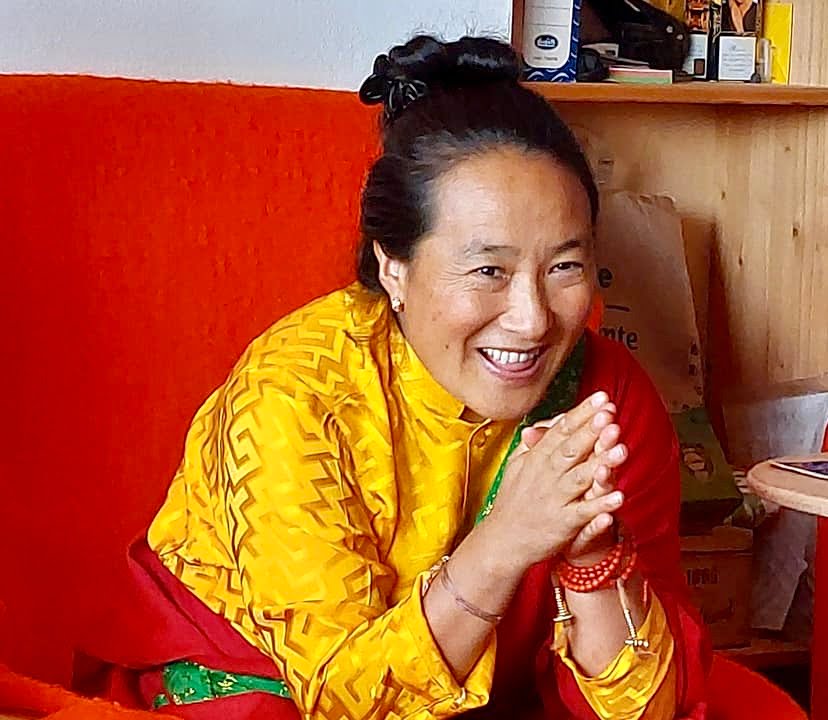
At a gathering of the sangha at Istituto Lama Tsong Khapa in May 2022, Khandrola was asked, what is our role as monastics in helping an increasingly suffering world? How far do we engage and then how far do we say ‘I need to get enlightened’ and focus on study and meditation?
Khandrola: There is no end to the suffering in the world because sentient beings voluntarily engage in creating the causes of suffering and therefore suffering arises, again and again without limit.
For an ordained person the way of helping other people is not just by giving food and clothing and shelter and those kinds of things but primarily by meditating on bodhicitta and the wisdom realising emptiness. Ultimately, except for generating bodhicitta and the wisdom realising emptiness, we can’t directly or manifestly benefit sentient beings. Other ways of benefitting sentient beings are just temporary or adventitious.
We have to think about the suffering of the six kinds of migratory beings and try to eliminate that just as we protect our own eyes. We are very careful to protect our own eyes. Likewiese, regarding the sufferings of sentient beings, we have to continually observe whether we are doing something to help reduce that by generating in our own continuum at all times, renunciation, bodhicitta and the wisdom realising emptiness, and try to continually generate those realisations.
For ordained people the main thing is to uphold the view and the practice of Buddhism. They can benefit people by other ways also, but the main thing is to uphold the view and the practice of Buddhism by meditating on bodhicitta and the wisdom realising emptiness and renunciation. Within the Buddha’s teachings there are the scriptural teachings and the realisational teachings.
It is the main work of ordained people to engage in both of those by hearing and contemplating and meditating inseparably. So whatever we’ve learned or studied, we have to meditate on that and try to generate realisations and then so by actually generating the realisations of bodhicitta and the wisdom realising emptiness, that’s the only final way to really lead sentient beings to liberation from samsara and to the state of enlightenment.
As an ordained person we have gone forth from the home life. So having gone forth from the home life if we grasp at being attached to a particular group: like our family, or our own monastery or our own khangtsen, or a particular group then that’s not really like having gone forth, because there is still adherence to, attachment to a particular sect or group.
Rather, we need to recognise all sentient beings as having been our mothers, our kind mothers and kind fathers, and wherever we go to identify other people as having been my kind mother, my kind father, relatives etc. and work for the welfare and benefit of all sentient beings. But how do we work for their welfare and benefit? If we just give them medicine or clothing or schools and so forth, that’s not really the work of an ordained person. You don’t have to have gone forth and become an ordained person to do those things.
Of course those are beneficial, but the benefit is very small comparatively, so what’s much more beneficial is if we actually engage in the inseparable practice of hearing, contemplation and meditation and generate the realisations of the path that lead towards liberation and full enlightenment, especially renunciation, bodhicitta and wisdom realising emptiness.
So if we work to benefit sentient beings that way, by practicing Dharma, then gradually we generate the realisations of the different grounds and paths and we ourselves come closer to liberation and enlightenment and we can gradually bring other sentient beings to that state. That’s the only kind of final resolution to the suffering of samsara. There’s no other way.
One must recognise that the opportunity to be an ordained person is something really precious and sacred. This opportunity to be an ordained person and one’s own value as an ordained person and the opportunity to wear the three robes of an ordained person, to hold the vows and to engage with the three baskets of the Dharma, to engage in hearing, contemplation, meditation and practice the path, all this is really a precious opportunity that one has.
One has a good basis for generating the realisations of the path and working towards liberation and enlightenment. So one has to realise this kind of incredible opportunity to be an ordained person and practice in this way. Yet at the same time one shouldn’t become arrogant and proud, get a big head thinking, “I’m an ordained person”. One needs to analyse one’s own continuum and recognise what attachment one does have. Ask oneself, “What avarice, what malice do I have, what ignorance do I have, what arrogance and pride?” If you look at your own mind you’ll see, you’ll know. That’s something one needs to realise about oneself. In that way we should not become proud. So seeing these kind of faults that exist in oneself, one has to generate for oneself renunciation towards samsara, and towards others generate compassion, and in that way practice.
Translation: Ven Legtsok, transcription (lightly edited) Ven Dechen, photo Ven Massimo Stordi
